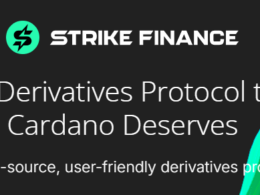Liqwid is an open source, algorithmic and non-custodial interest rate protocol built for lenders, borrowers and developers on Cardano.
The use of the Liqwid protocol unlocks access to a global liquidity fund for each asset. A borderless decentralized marketplace for lenders and borrowers, built on Plutus smart contracts.
Users of the protocol interact with money markets, implemented as a set of smart contracts that provide liquidity. Lenders provide assets when they perform the minting function of the market contract, and borrowers take on debt with their assets provided as collateral when they perform the function of the loan contract.
A user who owns ADA can supply his assets to the Liqwid protocol, and earn interest (denominated in ADA) without having to send tokens to a centralized third party, actively managing his possessions, and deciding to enter into high-risk loans for higher profitability.
The Liqwid protocol is a set of interconnected smart contracts that function as a decentralized money market on the Cardano blockchain. Holders of assets admitted within the protocol can earn interest by depositing them in the protocol. In return, the user receives the “qTokens” that represent a right to recover the assets deposited in the protocol together with the interest they have accumulated. If, for example, a user deposits ADA, they will receive “qADA” in return.
The owners of qToken as native active, can use any protocol to power generation performance (supporting qTokens) in Cardano.
Assets held within Liqwid’s market contracts earn APY’s (annual percentage yield), based on market demand for that asset. Anyone can access the smart contracts of the immutable money market, directly in the chain and participate in non-custodial markets keeping their keys.
The lender deposits assets in a Liqwid market contract, and receives qTokens that accrue interest. The deposited assets transferred to the market contract are instantly available to borrowers. Lenders can withdraw assets from the market contract at any time, as long as there is sufficient liquidity, (a condition that I will develop in later).
The borrower can borrow protocol assets instantly as long as they have deposited sufficient qToken collateral. The collateral factor is different for each asset approved by the protocol, for example, ADA will have a collateral factor of 70, which means that for every $100 of ADA value deposited, users can borrow up to $70 in any other asset of the protocol.
There is no expiration date for the credit and the interest rates on the amounts borrowed are updated in each block, based on the supply and demand of credits. Interest is accrued along with the principal to update the balance and the total balance must be repaid, leaving the market completely, to recover the deposited guarantee. If the loan is not repaid before the borrower’s liquidity account is negative, the system liquidates the loan and captures the collateral to pay the lenders. This mechanism protects the Liqwid protocol from the risk of credit default.
Developers building DeFi protocols, at Cardano, will be able to use the Liqwid protocol to monetize their DApps as a source of additional and ongoing performance, by keeping their balances in qTokens with interest.
Governance is exercised in a DAO (Decentralized Autonomous Organization), by LQ token holders, who use the governance smart contract to present proposals and exercise their voting power democratically. LQ is the foundation of Liqwid’s DAO governance and is placed as a reserve asset in the security fund, generating additional returns for LQ holders.
Tokenomics
qToken
The qTokens are natives tokens on the Cardano blockchain, functioning as assets that accrue interest, such as a savings account. Interest accumulates for lending assets, and thus the exchange rate of the qToken increases with respect to that of the underlying asset.
The difference in value between the qToken and the underlying asset is what is known as the time value of money, which corresponds to the accumulated interest that the holders of the qToken will receive. The value of any asset, such as the “XYZ” token deposited, will rise over time due to accrued interest.
Asset depositors with qToken can withdraw their underlying assets by burning qToken, at any time, but with the limit of the availability of assets in the protocol market, to preserve liquidity. Liquidity may decrease due to high market utilization. To solve the liquidity problem, the protocol has market reserves (or liquidity buffers) so that providers can recover their assets and exit the market.
LQ Tokens
LQ is the token of the Liqwid DAO and forms the basis of the decentralized governance of the protocol. As a native Liqwid asset, LQ, it is used in governance processes and as a reserve asset in layer 2 settlement events.
Tokens have a 1:1 voting power in the DAO. When LQ is delegated, it allows its holders to participate in governance, earn a share of rewards for delegating, and get additional performance from the layer 2 settlement mechanism.
LQ tokens are allocated at each epoch between providers (50%) and borrowers (50%). In addition, the allocation is distributed by market, where a multiplier can be added to incentivize the supply and loan of a certain token (market), for example stablecoins. Thus, the total LQs are distributed among providers and borrowers based on the amount of interest generated in the market during the epoch and the multiplier.
The distribution per user in each market is made pro rata of their total balance of offer or loan. This mechanism rewards the users who generate the most value in the protocol and, finally, the first users and members of the community.
The total amount of LQ tokens will be 21,000,000.
Transaction ID: https://cardanoscan.io/token/8e420ce194ca84040ba6971e6ab816e3d76ee9ee
Distribution percentages are designed to facilitate the most decentralized community-led protocol, effectively mitigating governance risk and ensuring that power is not in the hands of a few.
Liqwid pledged to conduct a fair token launch: no ISO, no pre-sale, and no investment from VC (Venture Capital). The Core Team initiated the development of the project through funds raised in Project Catalyst.
70% of the total LQ is reserved for community distribution.
https://drive.google.com/file/d/1uZNmg72LO19br7s_besobV6RpYJl4Rfl/view
A total of 14,700,000 LQ will be distributed to the community over 3 years from the time of genesis. The token launch schedule is deflationary, with the total remaining LQ amount being halved annually to reward early adopters.
The token distribution is as follows:
https://liqwid-labs.gitbook.io/liqwid-docs/faq
The LQ tokens assigned to the Core Team will be distributed according to a linear token vesting (release) schedule, which It will periodically deliver LQ to the Core Team, advisors, and technology partners over the course of two years from the genesis time. The tokens allocated for the founding team, advisers, technology partners, and future hires (25%) are held by a Plutus vesting smart contract, which releases the tokens linearly by epoch over two years. The vesting period of the tokens begins at the time of the release of version 1 (Mainnet).
Road Map
Q4 2021
- External Security Audit
- Mainnet
- LQ Fair Token Launch
- Decentralized Autonomous Organization (DAO)
- Community Governance
Q1 2022
- Secondary Product Offerings
- LiqwidUSD Mainnet & Integration
- Plutus DeFi SDK & Integrations
External audit
Plutus on-chain code (validation scripts) of the protocol Liqwid will be externally audited by the team Tweag.
They did not publish an exact date for the audit to begin, and it is expected to take a total of 4-6 weeks to complete. The protocol will be released on the mainnet after the audit.
Non-exhaustive audit task list:
- Property based testing (QuickCheck),
- Unit testing,
- Penetration testing of every function in each Liqwid validator script,
- initial findings report,
- final audit report.
The Team
It is composed of traditional finance industry veterans DEFI Haskell developers and power users.
They are, Dewayne Cameron, founder, Joshua Akpan, Tashoma Vilini and Florian Volery, co-founders, and many others.
Partner: Mlabs have an extensive team consisting of many members experienced in Haskell, Plutus, and Rust. Their work varies from code auditing, to project consultancy, and protocol creation.
They have been pioneers in the Catalyst project, presenting a total of 16 proposals, with 3 in the FUND1 (test), 8 more proposals that have obtained funding, keeping 5 more in Reserve. You can see them listed by displaying the menu: Ideas Contributed.
You can read an article that I have published in AdaPulse, about one of their latest proposals that have been funded: Liqwid Protocol Security Audit.
In the next article, will discuss the operations of the loan protocol and governance.
Web Site: https://www.liqwid.finance
Source: White Paper Version 1.5










